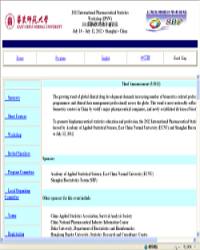NHRI Communications

學術交流
2012國際醫藥統計研討會紀要
Report on 2012 International Pharmaceutical Statistics Workshop
 鑑於全球臨床醫學的快速發展,對於生物計量相關的專業人員(包括生物統計師、臨床程式師和臨床資料管理人員)之人數和技術上的需求也提高。為了促進生物統計的專業教育培訓,中國華東師範大學應用統計科學學院與上海生物統計論壇於2012年7月10日至12日假上海舉辦2012國際醫藥統計研討會。
鑑於全球臨床醫學的快速發展,對於生物計量相關的專業人員(包括生物統計師、臨床程式師和臨床資料管理人員)之人數和技術上的需求也提高。為了促進生物統計的專業教育培訓,中國華東師範大學應用統計科學學院與上海生物統計論壇於2012年7月10日至12日假上海舉辦2012國際醫藥統計研討會。本次會議主題包含「Survival trial and oncology」、「Preclinical and early development statistics」、「Personalized medicine and biomarker」、「Biosimilarity」、「Noninferiority trial」、「Adaptive design」、「Statistical programming」、「Clinical data management」、「Multi-regional clinical trial」、「Pharmaco-vigilance and pharmaco-epidemiology」、「Bayes statistics and medical device」、「Independent data monitoring committee」、「Regulatory statistics (panel discussion)」、「Biostatistics education and career promotion (panel discussion)」。筆者因美國杜克大學周賢忠教授邀請,參與 「Biosimilarity」 主題發表研究成果「A consistency approach for evaluation of biosimilar products」。
生物製劑成品為大分子藥物如蛋白質、核酸等。但由於這樣的生物藥品的費用均相當昂貴,因此使得一般病人使用情況,有所侷限。未來幾年內,一些專利將到期的生物製劑,將提供其他生物科技公司或是藥廠製造相似生物製劑的學名藥;此種學名藥,美國FDA稱為follow-on biologics,而歐盟則稱之為生技仿製藥(biosimilars)。生技仿製藥定義為非專利生物製劑,有別於小分子藥物,小分子藥物專利過期後稱為學名藥(generic drug),生物製劑在專利到期後,利用已有之數據進行仿製製造生產上市的藥品。病人、醫療組織和政府機構為求降低生物製藥的售價,因此對生物仿製藥的需求日漸增加,還有未來,面臨生物製藥產品專利相繼到期,讓全球生物仿製藥市場發現眾多商機。
目前世界上已經訂定生物仿製藥相關法規的國家包括歐盟、日本、南韓、台灣、新加坡、馬來西亞、澳洲、沙烏地阿拉伯、土耳其、加拿大、美國、阿根廷、智利與墨西哥。但由於中國大陸及印度在生物仿製藥方面的早期發展,因此在這些國家上市的產品相當多,特別在中國大陸,如EPO、Interferon等,都是大陸早在專利過期前就已仿製上市。目前中國與印度的法規,正在訂定中。在我國,為確保國人用藥安全及促進台灣生技醫藥產業的發展,政府在2008年11月21日,由行政院衛生署正式公布「藥品查驗登記審查準則-生物相似性藥品查驗登記」。除了提供廠商未來申請生物相似性藥品上市審查的指引外,亦同時一併將各類可能影響用藥安全的風險因子納入規範中。
針對一般小分子的藥物,各國法規單位均已完整建立針對學名藥上市所需之評估與所需之統計方法。不像一般的小分子的藥物,生物製劑的分子構造、製藥過程、分析方法或可能之炎症的免疫反應,均具有相當的異質性與複雜性。因此如何去評估生物製劑的相似性,便具有相當的挑戰性。周賢忠教授於此演講中,完整提供過去評估學名藥所建立的方法,並介紹評估小分子藥物之相似性與生物製劑相似性兩者之差異。另外,周教授亦詳細介紹目前各國關於法規的需求。最後,他也提供一些評估生物製劑相似性的統計方法。
由於發展生物仿製藥可能須評估其效能性與安全性,如此便可能須執行臨床試驗。首先面對的問題是如何來設計生物仿製藥之臨床試驗?如果根據傳統臨床試驗之方式,則臨床試驗的花費將可能相當驚人,因此便無法降低生物仿製藥發展之成本!其次,一旦執行了臨床試驗,如何判斷生物仿製藥的藥效與原先之專利藥之效能性與安全性類似呢?筆者本次報告的內容為利用貝式most plausible prediction方法來評估生物仿製藥臨床試驗所得到之資料與原來專利藥所得到之臨床資料的相似性。假設原來專利藥已經執行了K個臨床試驗,且根據這K個臨床試驗,已經證實了專利藥的效能性。在此情況下,如果所得到生物仿製藥臨床試驗之藥物效能性,只要不比這K個臨床試驗中之最差的藥物效能還要遜色的話,我們即可推得此生物仿製藥亦具有相當的效能性。根據此準則,我們亦可根據先前原來專利藥之臨床試驗結果,以預估生物仿製藥臨床試驗所需之樣本數。
另外來自加拿大的Dr. Laszlo Endrenyi 則介紹「Some Statistical Issues on the Similarity and Interchangeability」。生物製藥並非像一般小分子藥物由化學合成,而是利用活的組織製成。因此,它們的製程便會對環境因子相當敏感。新的生物製藥不可能被複製,僅可能被仿製,如此更增加判斷生物仿製藥的困難。所有可能判斷相似的因子,包括complicated structural and functional features、製造過程與臨床反應均應列入考量。由於生物仿製藥的變異相當大,因此造成統計方法的評估更加複雜。而要判斷生物仿製藥與專利藥之相似性,便不得不探討生物製劑之交換性問題。交換性意旨藥物須具有相同份量的有效成分、具備相似藥物動力學性質、相似臨床特性與相似的使用方式。探討小分子藥物之交互性的統計方法已經相當完整,然而目前仍未有較有效的統計方法,可用以評估生物製劑的交換性。這是統計學家將來可以努力的方向。
此外,「Personalized medicine and biomarker」亦為藥物發展的另一重要議題。來自BeiGene的Dr. Yue Wang介紹「Statistical considerations during the drug discovery and drug development of patient selection biomarkers」。統計方法於藥物的發展與藥物效能性與安全性的評估相當重要,新的統計工具與方法的發展,將可提供較好臨床研究路徑;例如將有效的治療方法,可以最快的速度與最經濟的方式獲得上市。過去10年來,愈來愈多的目光聚焦於如何將科學發現轉譯於臨床發展。如此的轉譯研究主要關鍵範圍包含藥物標的鑑定(target identification)、early mechanism readout endpoints和 patient selection markers等。關於這些領域,雖然目前已有眾多統計方法可以應用於藥物標靶性之鑑定與patient selection markers,未來仍須仰賴更多統計方法的發展,使藥物的發展更有效率。
《文:群體健康科學研究所臨床試驗統計組蕭金福研究員;圖:大會網頁》